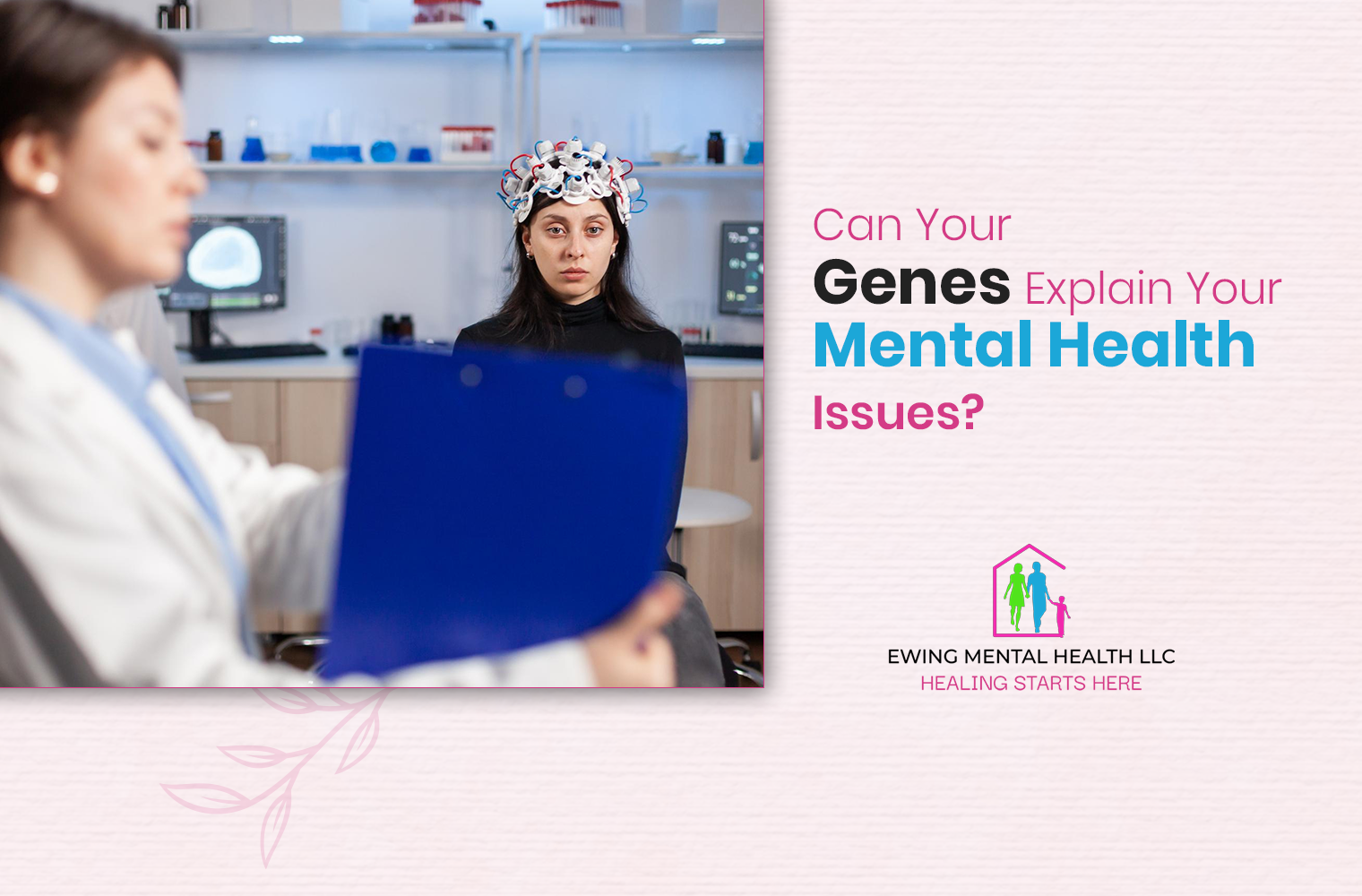Mental health can feel like a deep ocean, sometimes calm, sometimes stormy. You might wonder why you feel anxious, sad, or stressed when others seem fine. You might ask, “Can Your Genes Explain Your Mental Health Issues?” This question can open new paths to understanding yourself. Today, we will explore how your DNA might play a part and how Ewing Mental Health’s psychogenomic testing can illuminate your unique needs.
What Is the Link Between Genes and Mental Health?
Inside every cell of your body lives DNA, a tiny instruction book that tells your cells how to grow and work. Some of these instructions can affect your mood, behavior, and how you handle stress. Scientists have found that specific gene patterns can make people more likely to experience depression, anxiety, or other mental health challenges.
But genes do not work alone. Life events, friends, family, and daily routines also shape your feelings. Genes are like one piece of a large puzzle. They give clues but do not tell the whole story. Understanding your genetic clues can help you and your mental health team build a clearer picture.
How Psychogenomic Testing Works
Ewing Mental Health offers an advanced service called Psychogenomic Testing. This is a special way to examine how your genes relate to your mental health. Here is how it works:
Sample Collection
- You provide a small sample, usually from saliva or a simple cheek swab. This is quick and painless.
DNA Analysis
- In a lab, experts read your DNA instructions. They look for markers like flags that might link to mood, thinking, or behavior patterns.
Report Creation
- Your mental health professional gets a detailed report. This report shows which genetic markers you have and explains what they might mean for your mental health.
Treatment Planning
- Your therapist or healthcare provider uses this report to choose medicines, therapies, or lifestyle changes that fit you best, no more guessing which treatment will help.
Advantages of Psychogenomic Testing
Ewing Mental Health’s psychogenic tests offer many benefits:
In-Depth Understanding
- You learn more about your mind’s wiring. You and your care team uncover hidden themes in your mental health
Personalized Treatment
- Because the report is based on your genes, treatments can be picked to match your body. This means medicines may work better and faster, with fewer side effects.
Validation
- Seeing the test results can confirm your experiences. You know your feelings have a real, biological piece. This can feel validating and comforting.
Focused Approach
- The insights help your therapist target tricky areas. You spend less time trying treatments that don’t fit and more time on what enables you to grow.
Inside Your DNA: What Markers Matter?
Some gene markers relate to how your brain chemicals balance. For example, they can affect serotonin, which helps you feel happy and calm. Other markers influence dopamine, which is tied to focus and reward. If your report shows you have markers for low serotonin, your therapist might suggest exercises, foods, or medicines to lift your mood.
Markers can also hint at how you respond to stress. People vary in how quickly their stress systems turn on and off. Knowing your pattern can guide stress-busting tools like breathing exercises, meditation, or gentle movement.
Who Can Benefit from Psychogenomic Testing?
Psychogenic testing is helpful for people who:
- Feel stuck after trying different treatments.
- Have strong side effects from medicines.
- Want to understand why they feel a certain way.
- Wish to take a more personal route to mental wellness.
Testing can offer extra peace of mind even if you are doing okay. You will know which approaches your body may welcome.
Integrating Testing into Your Care
Initial Talk
- You meet with a counselor who explains testing and answers questions.
Sample Day
- A trained staff member guides you through the quick collection.
Wait Time
- Labs usually take a few weeks. This gives you time to reflect and prepare questions.
Follow-Up Session
- You review your report with your therapist. You pick goals and the next steps together.
Ongoing Support
- Ewing Mental Health stays by your side. You adjust the plan as you grow and learn.
Beyond DNA: The Bigger Picture
While genes give valuable clues, Ewing Mental Health knows your story includes more. They offer therapies like talk therapy, group support, and life-skill workshops. Diet and sleep coaching, art therapy, and gentle movement classes round out care. Your genes set the scene, but you write each chapter.
Next Steps: Taking Charge of Your Mental Health
Reach Out
- Contact Ewing Mental Health for a consultation. Ask about psychogenomic testing.
Learn More
- Read articles, watch short videos, or join a support group to hear about others’ journeys.
Try Simple Steps
- Start a gratitude journal, walk in nature, or talk with a friend. Small habits can boost your well-being.
Consider Testing
- If you’re curious, testing can offer a clear starting point. It may reveal patterns you never knew.
Conclusion
Mental health is a mix of many threads, life events, feelings, relationships, and, yes, genes. By asking, “Can Your Genes Explain Your Mental Health Issues?” you may discover helpful clues hidden in your DNA. Ewing Mental Health’s psychogenomic testing brings these clues to light. With clear reports, caring experts, and a plan tailored just for you, the path forward can feel hopeful and bright.
Remember: your genes are parts of your story, not the whole tale. You hold the pen. With the right insights and support, you can write new chapters complete with growth, understanding, and well-being.
FAQs
Is testing safe?
Yes. Samples are handled with strict privacy rules. You own your data.
Will genes change?
No. Your DNA remains the same. But knowing your markers helps shape better care over time.
Can kids be tested?
Yes, with parental permission. Early insights can guide gentle support and healthy habits.


